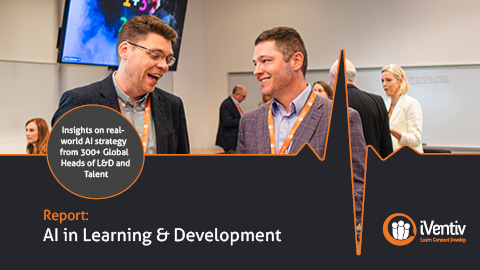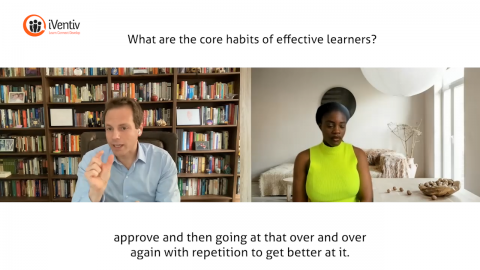Submitted by Richard.Parfitt on
Artificial Intelligence has become impossible to ignore in Learning and Development (L&D). Over the past few years, as awareness of AI tools has grown, AI has come to sit firmly at the centre of strategy for many global learning leaders. According to a new report from iVentiv, 59% of Global Heads of L&D and Talent now rank AI as their top priority, ahead of leadership development, reskilling, and learning culture.
This sharp rise, from 41% in 2024, signals more than curiosity. It marks a shift from AI experimentation to enterprise-wide transformation, and from “if” to “how” AI can drive meaningful impact in L&D.
The Impact of AI in Learning and Development
The report reveals that AI is influencing every part of the learning ecosystem. CLOs across industries are exploring how AI can help L&D teams prepare their organisations for the future of work. Leaders are shifting from content delivery to performance enablement, with AI enabling personalised and data-driven learning experiences.
At McKinsey & Co, for example, AI is being used as a “copilot” to provide real-time feedback and coaching, embedding learning directly into the flow of work. Meanwhile, at Bosch, AI supports reskilling at scale while transforming learning into a leadership priority.
These examples show that companies using AI for training and development are not only improving efficiency but redefining what effective learning looks like.
The Benefits of AI in Learning and Development
For L&D professionals, the benefits of AI in L&D go far beyond speed and automation. Our research highlights two major themes shaping this transformation: skills and personalisation.
AI learning and development tools are helping organisations conduct deep skill mapping and gap analysis, creating opportunities to build skills-based organisations where employees move more fluidly across roles. Yet, the challenge remains in moving from mapping to meaningful action, aligning these insights with business needs and day-to-day performance.
On the personalisation front, AI is enabling what Docebo’s CLO Brandon Carson calls “scaling to one”. From AI-powered coaches to adaptive learning journeys, personalisation allows organisations to tailor development at an individual level, something that may have been impossible at scale just a few years ago.
This shift reflects a broader ambition across L&D: to deliver individuality at scale, combining the reach of technology with the nuance of human learning.
Moving Beyond the Hype
However, iVentiv’s research also highlights that many L&D teams are still navigating barriers to adoption. Change management remains a top concern, with leaders emphasising the need for future-focused executives, psychological safety, and a culture that supports experimentation.
The report notes that AI tools continuously evolve, and the skills required to use them are in constant flux. This means that building capability for AI goes hand in hand with preparing people for change—an area where Learning and Talent teams are uniquely positioned to lead.
What’s Next for AI in L&D?
As the data in this report makes clear, AI in L&Dt is not a passing trend. It is rapidly becoming the engine of transformation across organisations, enabling agility, fostering innovation, and preparing the workforce for the future of work.
For L&D professionals, the opportunity is now: to go beyond pilot projects, turn insights into enterprise-wide action, and build learning ecosystems where AI helps people and performance thrive together.
Discover the full findings, with real-world case studies from E.ON, Bosch, and McKinsey. Download the full iVentiv “AI in Learning & Development” report to explore how global learning leaders are turning AI from hype into measurable impact.
Related Resources
- From Experimentation to Transformation: The Future of Learning and AI
- Leading in the Age of AI: The Future of Learning, Talent, and Leadership
- The Top Priorities for Chief Learning and Talent Officers So Far in 2025
- What’s Now and What’s Next: Inside the Minds of Today’s Learning Leaders
- What Makes a Good Learning and Development Budget in 2025?
- The Future of Learning, Talent, and Leadership
- The iVentiv Pulse: What Are The Top Priorities for Heads of Learning and Talent in 2025?










